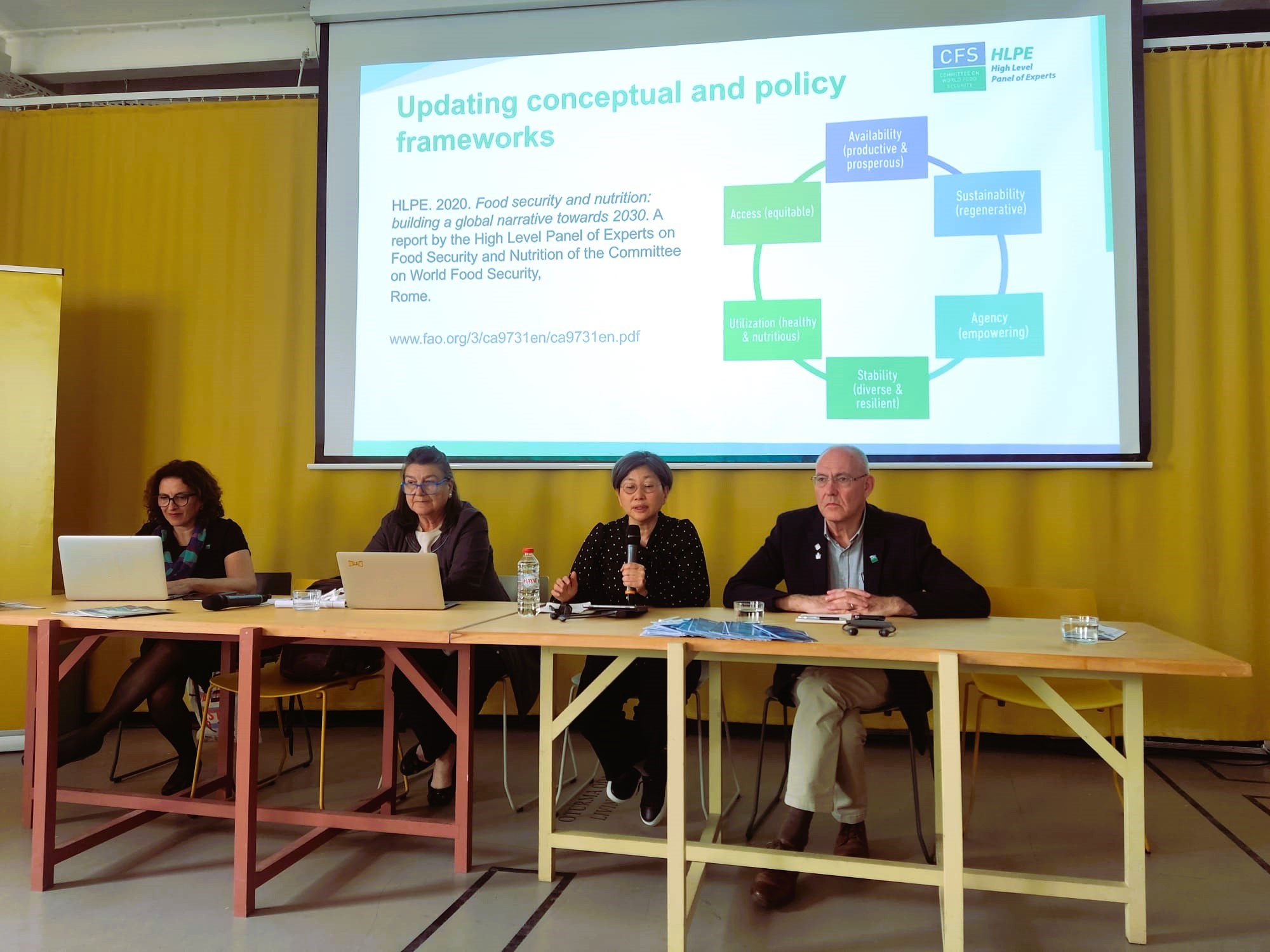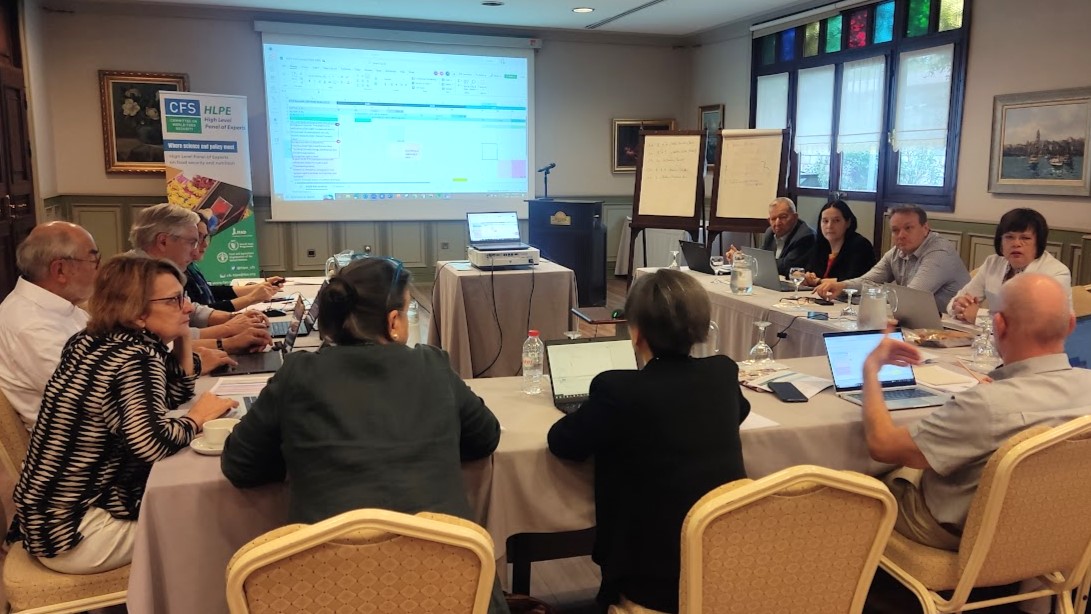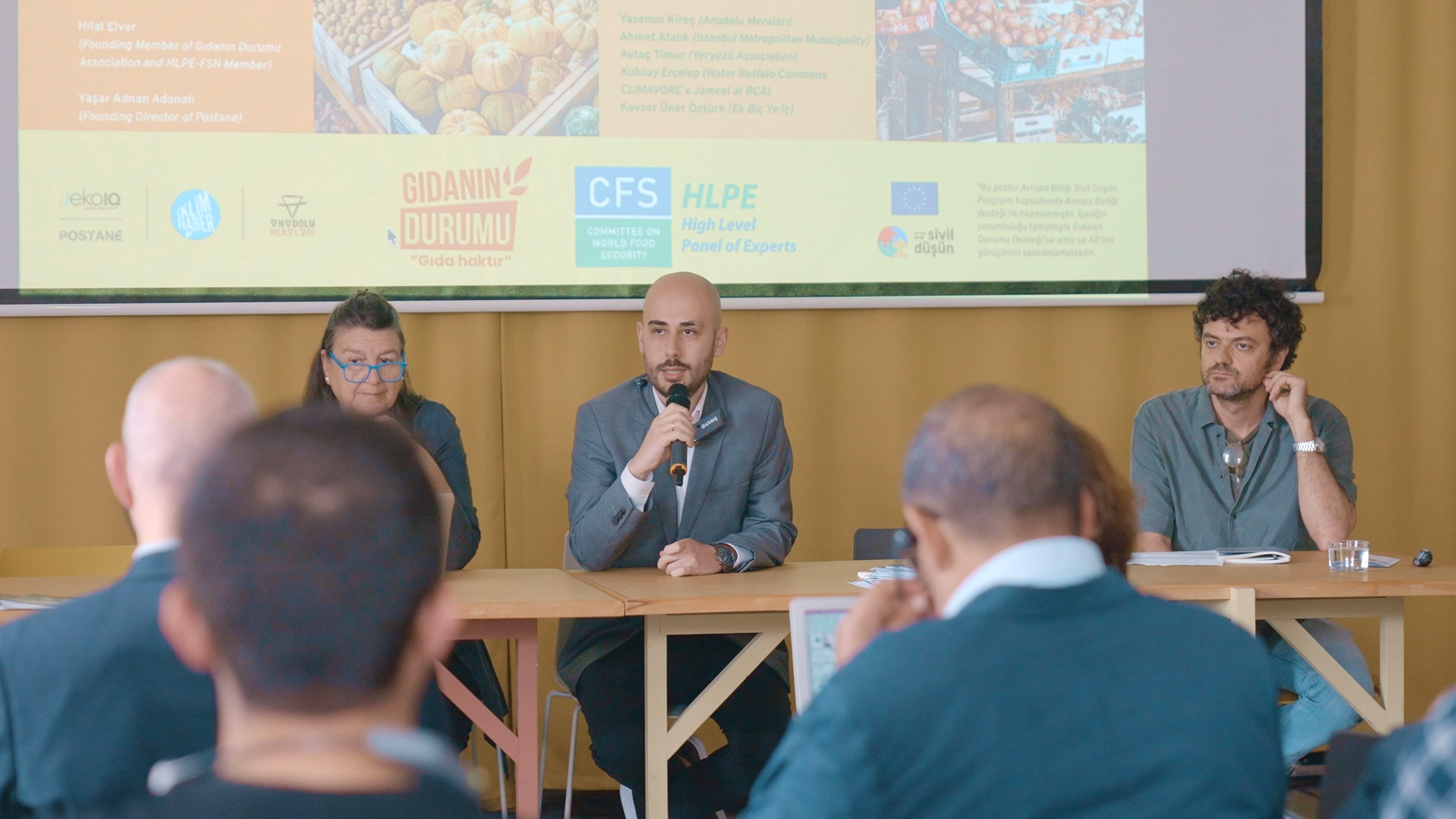
©CFS HLPE-FSN/Silvia Meiattini
Highlights from the 32nd HLPE-FSN Steering Committee meeting
The 32nd meeting of the Steering Committee of the High Level Panel of Experts on Food Security and Nutrition (HLPE-FSN) of the Committee on World Food Security (CFS) was convened from 15 to 17 April 2024 in Istanbul, Türkiye. The meeting discussed updates and challenges of the global food security and nutrition agenda and experts could work on priorities and upcoming reports, working procedures and calendars.
A key itemt of the meeting was the working session with the drafting team of the HLPE-FSN report #19, "Strengthening urban and peri-urban food systems to achieve food security and nutrition in the context of urbanization and rural transformation". Progress towards finalizing this report is proceeding according to plan, reflecting the commitment to addressing this complex issue amidst rapid urbanization and rural shifts. "Urban and peri-urban food systems are vital to food security and nutrition and exposed to different types of vulnerability than planners traditionally expect, hence these food systems require special and innovative evidence-based policy attention. These types of systems will become ever more important given demographic trends and urbanization that are bringing more people into urban settings. Furthermore, urban and peri-urban food governance can be transformative of wider food systems. In this context, interventions should be guided by an understanding of the interactions between food security and nutrition, food systems, other systems, governance processes and urbanization", Jane Battersby, HLPE-FSN drafting team leader explained.
"Urban and peri-urban food systems are vital to food security and nutrition and exposed to different types of vulnerability than planners traditionally expect, hence these food systems require special and innovative evidence-based policy attention. These types of systems will become ever more important given demographic trends and urbanization that are bringing more people into urban settings. Furthermore, urban and peri-urban food governance can be transformative of wider food systems. In this context, interventions should be guided by an understanding of the interactions between food security and nutrition, food systems, other systems, governance processes and urbanization", Jane Battersby, HLPE-FSN drafting team leader explained.
Find out more: “The urban future: what lies ahead for food security?”
The meeting also spotlighted the enduring challenge of realizing the right to food globally and the profound impact of conflicts on food security and nutrition, with a specific focus on the situation in Gaza. Such discussions underscored the urgent need for coordinated efforts to mitigate the adverse effects of conflicts on vulnerable populations.
According to the latest Global Report on Food Crises (GRFC), nearly 282 million people in 59 countries and territories experienced high levels of acute hunger in 2023 - a worldwide increase of 24 million from the previous year. This rise was due to the report’s increased coverage of food crisis contexts as well as a sharp deterioration in food security, especially in the Gaza Strip and the Sudan.
Looking ahead, the Steering Committee embarked on defining the scope and expertise needed for the HLPE-FSN Reports #20 and #21, addressing critical themes of building resilient food systems and preserving Indigenous Peoples' food and knowledge systems. A call with Barbara Burlingame, former member of the Steering Committee and expert on Indigenous Peoples' food systems, provided valuable insights into addressing the main challenges in this regard.
Moreover, the CFS Multy Year Programme of Work (MYPoW) 2024-2027 and the CFS requests were discussed and a productive call with the CFS Chairperson, H.E. Ambassador Nosipho Nausca-Jean Jezile allowed members to prioritize and organize their work for the upcoming months. Amb. Nosipho expressed her gratitude extending her "heartfelt appreciation for the dedication and great commitment by the distinguished and professional Steering Committee members of the CFS HLPE-FSN" and for their contribution in strengthening the impact recommendations and agreements and the collaborative governance for coordinated policy responses to emerging global food crises towards sustainable agriculture, food system transformation and the realization of the right to food.
A highlight of the meeting was the visit to the Yedikule Gardens, a historic green space in Istanbul and a symbol of resilience and sustenance throughout centuries. These urban gardens are a cultural and productive patrimony facing the challenges of conservation, development and social inclusion, in the phase of changing urban environments and growth. This visit, in collaboration with local NGOs, showcased the importance of urban and peri-urban agricultural heritage and local food systems.
The meeting culminated in the public event "Urban agriculture and the right to food", focusing on urban food systems, fostering dialogue between the Steering Committee, local associations and partners, NGOs, and local governmental representatives. Discussions highlighted innovative practices and traditional approaches to improve food security and nutrition, emphasizing the pivotal role of local initiatives in addressing global challenges. FAO and WFP representatives also participated in the event.
"The HLPE-FSN adopts a human rights approach to food security and nutrition and analyzes its six dimensions. The concept of food security has evolved to recognize the centrality of agency and sustainability, along with the four other dimensions of availability, access, utilization and stability. These six dimensions of food security are reinforced in conceptual and legal understandings of the right to food", Akiko Suwa-Eisenmann, Chairperson of the Panel explained at the beginning of the event.
 Moreover, a vibrant debate ensued, addressing diverse dimensions of food security and nutrition, including food inflation, purchasing power, informality, and the impact of low-nutrient diets and pollution on children's health. These discussions underscored the multifaceted nature of food security challenges and the imperative for holistic approaches to address them effectively.
Moreover, a vibrant debate ensued, addressing diverse dimensions of food security and nutrition, including food inflation, purchasing power, informality, and the impact of low-nutrient diets and pollution on children's health. These discussions underscored the multifaceted nature of food security challenges and the imperative for holistic approaches to address them effectively.
Read more on LinkedIn about the public event
In closing, the 32nd HLPE-FSN Steering Committee meeting was a very fruitful one, exemplifying a collaborative effort to advance global food security and nutrition. Through dialogue, research, and partnership, HLPE-FSN experts reaffirmed their commitment to building equitable, sustainable and resilient food systems for all.